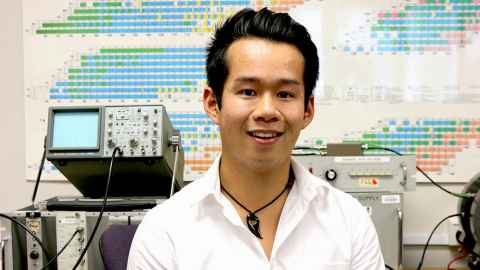University of Auckland student to accelerate possibilities at CERN
3 April 2017
Final year Engineering and Physics student Harry She has been awarded a prestigious Non-Member State Summer Studentship.

Final year engineering and physics student Harry She has been awarded a prestigious Non-Member State Summer Studentship to CERN, the European Organization for Nuclear Research. Harry, who is completing a conjoint degree in Software Engineering and Physics, leaves for CERN at the end of Semester One.
CERN may be most recognisable for confirming the Higgs Boson – or “the God Particle” in 2012. Located in Geneva, it is one of the largest hubs in the world for scientific research. To Harry, the work produced by CERN “represents an ideal of us striving to discover more, to be ever curious about nature, and to learn about what makes us human. I believe that being a part of CERN’s experiments will be a once-in-a-lifetime opportunity to enrich and deepen my understanding of engineering and physics”.
Harry is one of very few New Zealanders to ever receive this honour. At CERN, he will work on live experiments on a project alongside a research team, attending specially-prepared lectures and workshops, and visiting ground-breaking experimental facilities. He is particularly excited that he will have access to the Large Hadron Collider (LHC), the most powerful particle collider in the world.
Harry’s fascination with science and technology started at a young age. “Hearing about CERN and the 27 kilometre-long LHC; about colliding particles at energy levels never before achieved, just to unearth the profound mysteries of nature, has been a continual source of inspiration for me.”
His interest in science and technology inspired his programme choices at university – “Studying Software Engineering here equipped me with a plethora of skillsets that are globally in high demand, and information technologies are at the forefront of every major business. I also like that several computing achievements, including the World Wide Web, were invented at CERN. I would love nothing more than to be able to practice my software engineering competencies through their projects.”
Beyond formal study, Harry worked as an engineering intern for RocketLab in the summer, helping with the design and development of specialised software for mission control for the Electron Program. The project deals with the delivery of small payloads, including CubeSats, which directly relates to his other notable involvement in the inaugural year of the Auckland Programme for Space Systems (APSS).
His APSS team submitted a proposal to monitor nitrogen dioxide in the atmosphere to tackle the issue of global warming. It was awarded the ‘Most Likely to Succeed Mission’ prize last year. He believes that both space-related projects were fundamental to improving his interpersonal skills. “As engineers and scientists, we no longer live and work in ivory towers. The best outcomes are transdisciplinary, participatory and collaborative”.
Harry says the scholarship is an extraordinary opportunity to be amongst the largest science experiments in the world, and he hopes to inspire others in the country to consider applying for it. “I am privileged to represent New Zealand amongst the most intelligent and passionate engineers and physicists in the world; all working together to discover and unravel the many mysteries of our universe.”